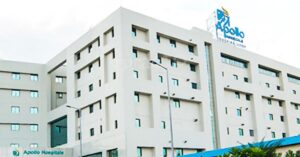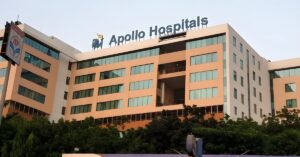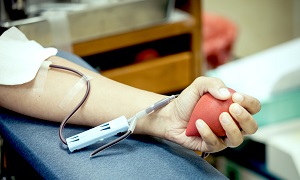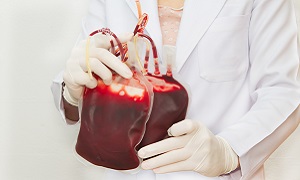Best Allogeneic BMT Doctors in India
Best Allogeneic BMT Hospitals in India
- City: New Delhi, India
Hospital Highlights:
- Equipped with 650 beds, BLK-Max Super Speciality Hospital is the largest stand-alone private sector hospital in Delhi.
- With over 1500 healthcare providers and 150 globally renowned super specialists, the hospital is one of Asia’s largest BMT Centres. The hospital is known for having some of the best cancer doctors in the country.
- The hospital is NABH and NABL accredited and was inaugurated by the first Prime Minister of India. Pt. Jawahar Lal Nehru.
- City: Hyderabad, India
Hospital Highlights:
- Located in the vibrant city of Hyderabad, Apollo Health City is a world-renowned medical facility that provides outstanding care and treatment to patients coming from different parts of the world.
- Founded in 1988, this 550-bed multispecialty hospital with 50 specialties and 12 Centres of Excellence continues to deliver outstanding outcomes for patients with the simplest to the most complicated medical conditions.
- Backed by the latest medical equipment and a dedicated team of professionals, the hospital provides comprehensive treatment across various specialties including, cardiology, critical care, neurosciences, cancer, orthopedics, gynecology, ENT, transplants, gastroenterology, etc.
- Apollo Health City is a cutting-edge healthcare facility that combines various facilities under one roof. These may include state-of-the-art physical medicine, rehabilitation, and wellness services with education, research, telemedicine, innovative medical devices, disease management programmes, and medical talents.
- The hospital is known for offering top-notch cancer treatment accompanied by cutting-edge facilities and technology.
- The hospital also offers a broad spectrum of cosmetic procedures that improve not just appearance but also comfort.
- In 2011, Apollo Health City was the recipient of the Asian Hospital Management Award (AHMA).
- In 2013, the Government of India recognized Apollo Health City as the top medical tourism destination in the country.
- City: Mumbai, India
Hospital Highlights:
- Kokilaben Dhirubhai Ambani Hospital, Named after the wife of Indian industrialist Dhirubhai Ambani, the founder of Reliance Industries, this is one of the top hospitals in Mumbai. This 750-bed multi-specialty hospital became operational in 2009. Known as one of India’s most advanced tertiary care facilities, the hospital is designed to raise India’s global standing as a healthcare hub, with an emphasis on excellence in clinical services.
- Kokilaben Dhirubhai Ambani Hospital uses Protocol and Care Pathway based treatment models to ensure the best outcomes for patients.
- The hospital represents a confluence of top-notch talent, cutting-edge technology, state-of-the-art infrastructure, and, most importantly commitment.
- The hospital also holds the accreditation of the NABH, NABL, CAP, and JCI.
- The hospital has been recognized as the No. 1 Multispecialty Hospital in Mumbai and the West Zone for the fifth year in a row in 2020 by The Week.
- City: Chennai, India
Hospital Highlights:
- Apollo Cancer Centre in Teynampet, Chennai is one of the best super speciality hospitals in India. It is the country’s first ISO-certified healthcare facility.
- Additionally, it is the first hospital in Chennai and the first oncology hospital in India to receive NABH accreditation.
- The hospital provides advanced tertiary care in oncology, orthopedics, neurology and neurosurgery, head and neck surgery, and reconstructive and plastic surgery.
- Additionally, it offers specialized healthcare of international standards with results comparable to those of the best hospitals in the world.
- It is outfitted with 300 beds, the newest and greatest technology, a large pool of highly qualified specialists, and a committed team of medical and paramedical professionals.
- It is one of the first few medical facilities in India to offer comprehensive cancer care. A team of skilled medical, surgical, and radiation oncologists makes up the Tumour Board, which is a component of the complete treatment planning system. After reviewing reported cases, the Board determines in concert with diagnostic specialists what course of action is best for each individual patient. The panel is further supported by dieticians, medical counselors, speech therapists, and other pertinent specialists.
- The hospital launched the first ExcelsiusGPS® Spine Robot in South India and has completed over 50 surgeries till date.
- It is also one of the few cancer hospitals in India to offer Cyber Knife therapy. Till now it has completed 1320 Cyber Knife therapies.
- The institution is also one of the few in India with the capacity to do transplants and find a prospective unrelated donor. The hospital has performed over 1000 BMTs till now.
- Furthermore, it has an exceptional milestone of performing exultant Micro vascular free tissue transfer and Aesthetic surgeries on more than 1000 patients with success.
- City: Chennai, India
Hospital Highlights:
- Apollo Hospitals, Chennai, is one of the best hospitals for heart care in India. Over the years, Apollo has expanded all over India, as a healthcare chain.
- India’s first ‘Only Pancreas’ transplant was performed in Apollo Hospital. The hospital is known for successfully performing Asia’s first en-bloc combined heart and liver transplant, and over the years, it has attained a remarkable achievement in the global healthcare space. Around 3-4 organ transplants are performed in the hospital per day.
- Equipped with over 500 beds, this hospital in Chennai was established in 1983 and since then has been among the most preferred hospital for patients from all over the world.
- The hospital holds accreditation of the NABH and JCI and is the first hospital in India to be ISO 9001 and ISO 14001 certified. It is also the first South Indian Hospital to receive subsequent reaccreditation from the JCI USA 4 times.
- City: Chennai, India
Hospital Highlights:
- Established in 1999, Gleneagles Global Hospital, Chennai, is one of the top healthcare facilities in Southern India. It is part of the Gleneagles Hospital Chain, which is the fourth largest healthcare chain in the country. The hospital specializes in multi-organ transplants of kidneys, liver, lungs, heart, etc.
- The hospital has an excellent infrastructure and state-of-the-art lab and equipment set-up. The hospital boasts cutting-edge technologies, a highly skilled team of doctors and surgeons, and trained support staff. Located in Perumbakam, Chennai, it is one of India’s premier health care destinations. The hospital has performed some of the most complex surgical and clinical procedures in India including multi-organ transplantations.
- The hospital’s lung transplantation program is one of the best in the country. The hospital is known for having performed India’s first single lung transplant and first minimal invasive lung transplant. It is also the only Indian hospital to be associated with King’s College Hospital, London, United Kingdom for liver transplantations.
- City: Hyderabad, India
Hospital Highlights:
- KIMS Hospital (a brand name of Krishna Institute of Medical Sciences) is one of the largest and best multi-speciality hospitals in Hyderabad. The hospital provides various treatments to an enormous number of patients.
- The hospital has a capacity of more than 3000 beds. KIMS Hospitals offers different healthcare services in more than 25 specialities and super specialities.
- The hospital is equipped with modern medical equipment and technology. It has robotic equipment to provide minimal invasive techniques for patients.
- The hospital is aimed at providing world-class healthcare facilities and services at an affordable cost for patients.
- The various specialities and departments of the hospital include neurosciences, gastroenterology & hepatology, robotic science, reproductive sciences, dental science, oncological sciences, organ transplantation, heart and lung transplantation and mother and child care.
- City: Kolkata, India
Hospital Highlights:
- Established in 2003, Apollo Gleneagles Hospitals is a 750-bed multispecialty tertiary care hospital situated in Kolkata.
- With 33 Centres of Excellence and more than 50 specialties, Apollo Gleneagles Hospitals, Kolkata is capable of handling all sorts of patients.
- This tertiary care hospital, which is a 100% subsidiary of Apollo Hospitals Enterprise Ltd., India, is regarded as one of Kolkata’s top hospitals.
- The facility is a complete blend of cutting-edge technology, state-of-the-art infrastructure, and genuine hospitality.
- Focusing on numerous specialties, the hospital provides all-inclusive medical treatments supported by cutting-edge technology and a staff of highly qualified medical specialists.
- Patients across the globe come to Apollo Gleneagles Hospitals Kolkata for their treatment. Moreover, international patients receive full attention and assistance for their treatment and are provided with a hassle free experience.
- Apollo Gleneagles Hospitals, Kolkata is the only hospital in Eastern India to hold the Joint Commission International (JCI) certificate.
- It is also the only hospital in Kolkata to hold the NABL accreditation in six different categories, which includes Clinical Biochemistry, Clinical Pathology, Hematology & Immunohematology, Microbiology & Serology, and Histopathology & Cytopathology.
- Furthermore, Apollo Gleneagles Hospitals, Kolkata is known for performing the first ever Reverse Shoulder Prosthesis Replacement in East India.
- City: Bengaluru, India
Hospital Highlights:
- Established in 1991, Manipal Hospital, Old Airport Road, Bangalore is the flagship facility of the Manipal Hospitals Group, which is one of the largest networks of Multispecialty Private Hospitals in India.
- The facility is well-known for its state-of-the-art technology, performance-driven, patient-centric, and evidence-based approach.
- The facilities offered at Manipal Hospital meet the highest international standards, allowing the hospital to attract a large number of national and international patients.
- Their expertise encompasses the diagnosis and treatment of a wide range of diseases in several specializations that address both simple as well as complex medical procedures.
- There are total 600 beds accessible in the hospital for the in-patients so they may heal while being closely watched after by the medical team. In addition, it has 144 critical care units, including NICUs, ICCUs, and ICUs. Apart from that, the hospital also offers 20 contemporary, modular state-of-the-art operating rooms with all the amenities needed.
- The hospital has several departments that are overseen by highly skilled, certified, and experienced medical experts.
- One of the best departments in the hospital is that of the Cancer department which is known for its advanced cancer diagnosis and treatment facilities such as Intracavitary Chemotherapy, Biological Therapy, HIPEC, PIPEC, Nuclear Medicine, Radiation Therapy, etc.
- It is one of the few hospitals in Bangalore that provides full range of pediatric services, including pediatric emergency services, pediatric gastroenterology, pediatric neurology, pediatric cardiology, pediatric orthopaedics, pediatric allergies, pediatric immunology, and infectious diseases.
- Furthermore, Manipal Hospital, Old Airport Road, Bangalore is also regarded as one of the best hospitals for bone and spine related disorders.
- City: Mumbai, India
Hospital Highlights:
- Established in 2016, Apollo Hospitals, Navi Mumbai is one of Maharashtra’s most advanced multispecialty hospital. This 500-bed hospital provides sophisticated treatments and integrated super specialty services under one roof.
- The hospital features a cutting-edge infrastructure that houses 13 state-of-the-art operating rooms, advanced laboratory and medical diagnostics, and 120 ultra-modern I.C.U. beds, including N.I.C.U. and P.I.C.U., monitored round the clock by critical care specialists.
- With 57 specialties and subspecialties, the hospital boasts a team of renowned medical specialists who offer accurate diagnosis and treatment with easy accessibility to their patients.
- Additionally, the hospital offers highly customized, individualized health check programs that are made to fit each person’s needs in terms of lifestyle.
- Apollo Hospitals, Navi Mumbai has been accredited by both the National Accreditation Board for Hospitals and Healthcare Providers (NABH) and the Joint Commission International (JCI).
- Apollo Hospitals Navi Mumbai has been awarded the “Best Practices-International Services Award” at the annual awards for service excellence and operations excellence.
What is Allogeneic Bone Marrow Transplant?
An Allogeneic Bone Marrow Transplant (or Stem Cell Transplant) is a type of Bone Marrow Transplant where you receive healthy bone marrow from a matching donor to replace your diseased or damaged bone marrow.
When is Allogeneic BMT recommended?
Allogenic Bone Marrow Transplant is generally recommended for patients who are undergoing treatment for multiple or serious cancer or non-cancerous conditions. The doctors based on your clinical examinations will help you determine whether the allogenic transplant procedure is a perfect fit for your condition or not. Nevertheless, here is a list of the possible diseases that might need allogenic bone marrow transplant to cure:
- Chronic or acute leukemia
- Aplastic anemia
- Hodgkin’s/ Non-Hodgkin’s lymphoma
- Neuroblastoma
- Plasma cell disorders
- Multiple Myeloma
- POEMS Syndrome
- Myelodysplastic syndrome
- Immune deficiency
- Inborn metabolism disorder
Common diagnostic tests for Allogenic Bone Marrow Transplant
Some common diagnostic tests recommended to determine the need or course of your allogenic bone marrow transplant are- blood tests, X-Ray, bone marrow biopsy, pulmonary lung tests, PET scan and most importantly, Tissue Typing.
Donor matching
Unlike autologous transplant, the success of an allogenic bone marrow transplant heavily depends on how successful the donor match is. Often, the donor is someone related to you such as sibling, parents or any close relative. However, in some cases, donor registries are used to find the closest match. This brings us to Tissue Typing, a clinical test opted by both the donor and the patient in which proteins called HLA or Human Leukocyte Antigens found in tissues and white blood cells are extracted and tested to determine if the donor’s HLA and the recipient’s HLA matches or not.
The process includes extracting blood from both the donor and the patient and then tissue typing the blood samples to find the right match
The usual donor types include:
- HLA matched relative
- HLA mismatched relative
- HLA matched non-relative (donor unrelated)
- Unrelated umbilical cord match
Stem Cell Extraction:
Once the doctors are able to determine the perfect donor match for you, the stem cell extraction process is started to filter out the healthy stem cells from the donor’s blood. There are primarily two methods used by doctors to extract the stem cells from the donor’ body. The hematology team will decide the best method applicable for you.
The PBSC Donation
In this method, the donor will be injected with Filgrastim, a medication that boosts the stem cell count in the donor’s bloodstream. Based on favorable conditions, the stem cell extraction process starts after a few days where thin tubes inserted into the donor’s arms is connected to a machine. Blood extracted from the body passes through the machine that filters out the stem cells as the rest of the blood is returned back through the other arm. The stem cells are then frozen for the transplant day. The donor will be awake throughout the procedure.
The Bone Marrow Donation
Allogenic Bone Marrow Transplant preparation
The preparation method consists of a procedure called the Conditioning or a preparative regimen where the patient has to undergo chemo or radiation therapy to destroy the damaged or infected stem cells that are crowding inside. The process usually takes place a few days before the actual transplantation process and might come with a few common symptoms. The procedure based on the patient’s condition may have to repeated more than once or twice to ensure all the diseased stem cells are completely cleared out of the system before the actual transplantation process starts.
This procedure is also important to suppress the patient’s immune system to avoid it from reacting to the new stem cells that’ll be introduced during the transplant process. The conditioning reduces the risks of a transplant failure due to the body’s proactive immune system.
The Procedure- Day Zero!
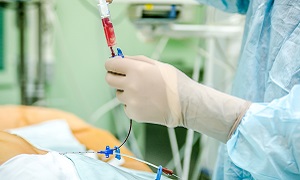
On the day of the transplant procedure, also known as Day Zero, the patient undergoes the transfusion through a thin tube called the Central Line injected into the chest area of the patient. The stem cells introduced will make it to the bone marrow and fill up the gap left by the diseases stem cells and over 10 to 28 days the effects of the new stem cells will start showing as they start to repopulate the area
What to expect after Allogenic Transplant?
The stem cells refrigerated after the conditioning process is often coated with a preservative which may or may not cause certain symptoms post the transplant procedure. These symptoms can be in the form of-
- Chest pain
- Fever
- Chills
- Nausea and Vomiting
- Headache
- Diarrhea
- Shortness of breath
- Fatigue
- Bleeding disorders
- Mouth ulcers
Possible complications
Due to the reduced immune system, patients may experience low blood count which in turn makes them vulnerable to certain infections. Patient’s may have to undergo blood transfusions if their haemoglobin level falls or antibiotics and medicines to flush out the preservatives from the system and to protect the body from being exposed to infections.
Another possible complication can be the GVHD or the graft-versus-host disease where the immune system of the patient recognizes the newly introduced donor cells as foreign and harmful and might attack it. The intensity of this complication varies from patient to patient and medical drugs and constant monitoring are prescribed to tackle this situation
Recovery & care after Allogenic Bone Marrow Transplant
You’ll be asked to stay back in the hospital for a few days to monitor your recovery during which the medical team will help you out with the required medicine doses and diet chart. However, once you are released, the care and recovery are completely dependant on the patient. Please keep these pointers in mind:
Maintain a strict diet. Ask your doctor or medical team for a dietary chart and abide by it strictly to improve your recovery rate.
- Ask your doctor about vaccinations necessary to help you improve your immune system.
- Always take your medicine doses on time and don’t make any changes in your everyday medical routine unless advised otherwise by the doctor.
- Avoid weight gain at all cost.
- Avoid strenuous physical activities but make sure you exercise to keep yourself from unwanted weight gain.
FAQs
What is the usual hospital stay for an allogenic transplant?
Hospital stays depend on the patient’s recovery rate. However, a minimum 2-4 week is given to monitor the condition and patients might be asked to stay back or visit for routine follow-ups to consistently monitor their recovery.
What is the success rate for allogenic transplant?
Usually, allogenic transplant success rates heavily depend on how close a match the donor is. With the right donor, the success rates can be as high as 60-80%
What are the chances of my family members being my donors?
Almost 7 out of 10 cases noted that family members weren’t a close match. The match works only 1 out of 4 times for brothers or sisters. This is why the bone marrow registry is also consulted and 1 out of 430 matches are selected to be the perfect match
Will donating bone marrow affect me in any way?
Usually, only 4-6% of the donor’s bone marrow is extracted and the bone marrow regenerates itself within 4-6 weeks. Donating bone marrow will not affect donors permanently.
Are there any symptoms or risks to donating bone marrow?
Risks are rare and affect only 1% of bone marrow donors seriously. However, donors may feel certain side effects in terms of headache, muscle pain, nausea, or common flu symptoms. However, if any symptoms persist for more than a week, contact the medical team immediately.
What happens if my transplant fails?
Even though it’s rare, a failed transplant is possible. However, in that case, doctors usually recommend a second transplant.
What happens if my cancer comes back?
The sole purpose of the medical procedure is to kill or prolong the diseased cells affecting you. Even though the success rate is high, some patients have experienced a relapse. However, this is rare and in such cases a second transplant is advised by the doctors.





